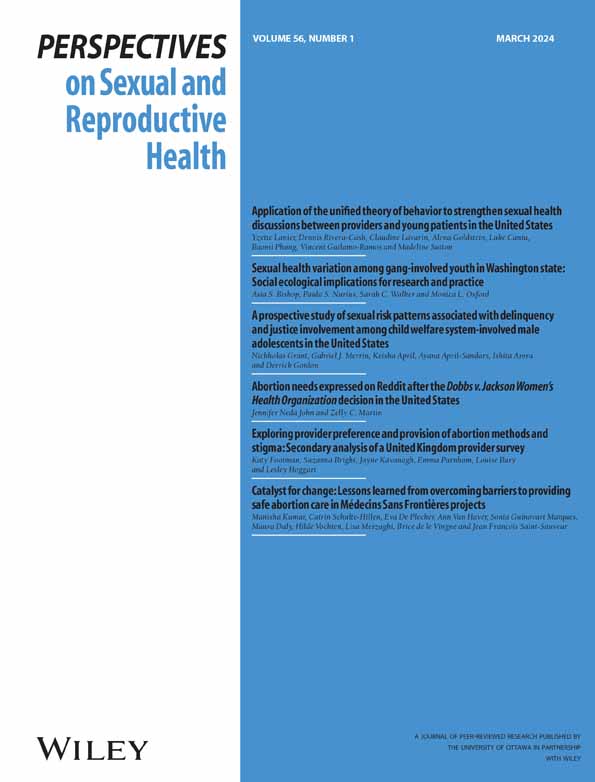来自大流行病中心的视角:纽约市移民妇女的性健康和生殖健康
IF 3.5
2区 医学
Q1 DEMOGRAPHY
引用次数: 0
摘要
背景美国对 COVID-19 的反应创造了一种政策、经济和医疗保健提供环境,对种族化和少数民族社区的性健康和生殖健康(SRH)产生了影响。来自美国大流行病中心--纽约市的异质移民社区的观点,让我们得以一窥限制性社会政策环境是如何影响避孕、堕胎、怀孕偏好以及边缘化移民社区性与生殖健康的其他方面的。方法我们于 2020 年和 2021 年对纽约市 44 名来自不同国家的顺性别移民妇女和 19 名移民社区直接服务提供者进行了深入访谈,以探讨移民如何被迫调整其性健康和生殖健康偏好和行为,以适应 COVID-19 大流行的结构性障碍。我们采用恒定比较法对访谈进行了编码和分析。结果与大流行相关的恐惧和医疗保健服务的结构性障碍影响了参与者在避孕药具使用和偏好方面的转变。移民妇女在选择避孕药具时权衡了她们对健康和安全的担忧以及面临歧视的可能性。结论了解移民妇女的性健康和生殖健康如何因 COVID-19 大流行的结构和政策限制而发生变化,可以揭示历史上被边缘化的社区将如何受到日益严格的生殖健康和移民政策环境的影响。本文章由计算机程序翻译,如有差异,请以英文原文为准。
Perspectives from the pandemic epicenter: Sexual and reproductive health of immigrant women in New York City
ContextThe United States' response to COVID‐19 created a policy, economic, and healthcare provision environment that had implications for the sexual and reproductive health (SRH) of racialized and minoritized communities. Perspectives from heterogenous immigrant communities in New York City, the pandemic epicenter in the United States (US), provides a glimpse into how restrictive social policy environments shape contraception, abortion, pregnancy preferences, and other aspects of SRH for marginalized immigrant communities.MethodsWe conducted in‐depth interviews in 2020 and 2021 with 44 cisgender immigrant women from different national origins and 19 direct service providers for immigrant communities in New York City to explore how immigrants were forced to adapt their SRH preferences and behaviors to the structural barriers of the COVID‐19 pandemic. We coded and analyzed the interviews using a constant comparative approach.ResultsPandemic‐related fears and structural barriers to healthcare access shaped shifts in contraceptive use and preferences among our participants. Immigrant women weighed their concerns for health and safety and the potential of facing discrimination as part of their contraceptive preferences. Immigrants also described shifts in their pregnancy preferences as rooted in concerns for their health and safety and economic constraints unique to immigrant communities.ConclusionUnderstanding how immigrant women's SRH shifted in response to the structural and policy constraints of the COVID‐19 pandemic can reveal how historically marginalized communities will be impacted by an increasingly restrictive reproductive health and immigration policy landscape.
求助全文
通过发布文献求助,成功后即可免费获取论文全文。
去求助
来源期刊
CiteScore
5.10
自引率
3.40%
发文量
24
期刊介绍:
Perspectives on Sexual and Reproductive Health provides the latest peer-reviewed, policy-relevant research and analysis on sexual and reproductive health and rights in the United States and other developed countries. For more than four decades, Perspectives has offered unique insights into how reproductive health issues relate to one another; how they are affected by policies and programs; and their implications for individuals and societies. Published four times a year, Perspectives on Sexual and Reproductive Health includes original research, special reports and commentaries on the latest developments in the field of sexual and reproductive health, as well as staff-written summaries of recent findings in the field.

 求助内容:
求助内容: 应助结果提醒方式:
应助结果提醒方式:


